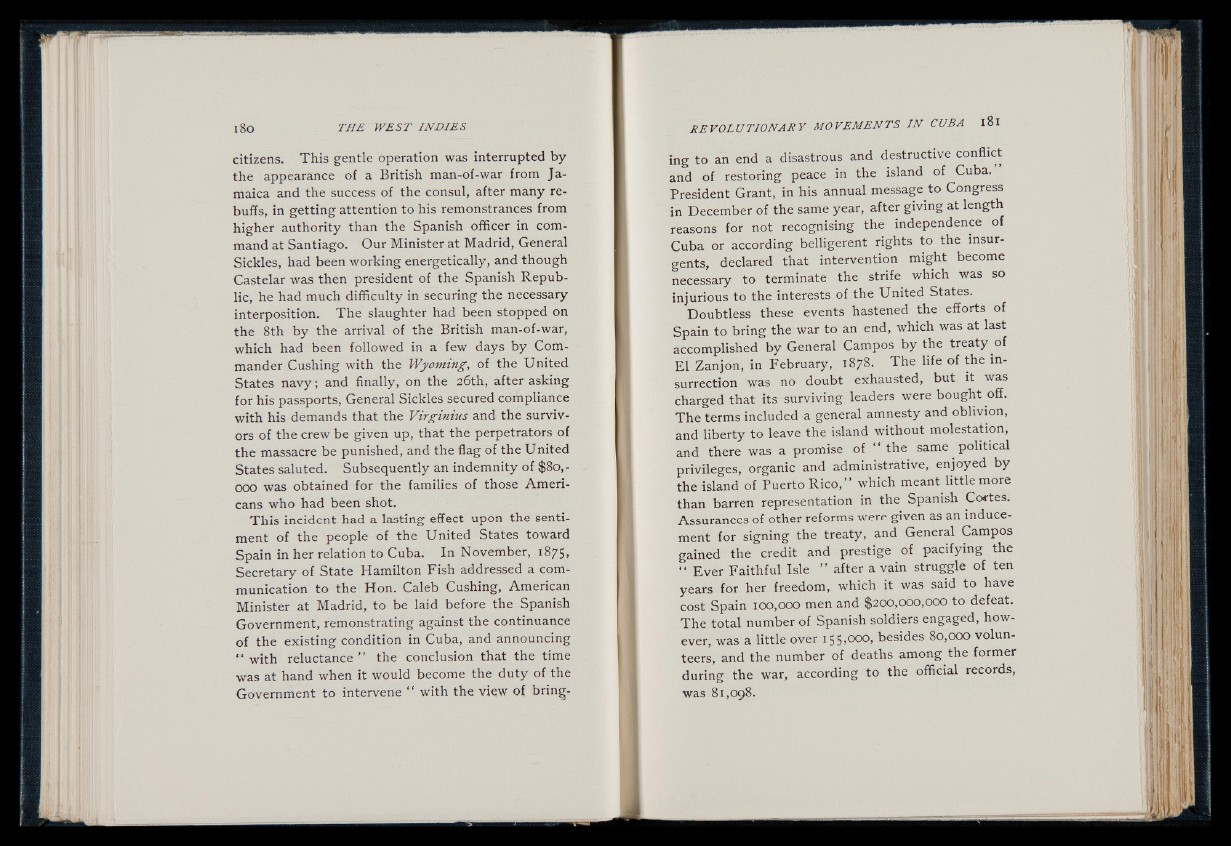
citizens. This gentle operation was interrupted by
the appearance of a British man-of-war from Jamaica
and the success of the consul, after many rebuffs,
in getting attention to his remonstrances from
higher authority than the Spanish officer in command
at Santiago. Our Minister at Madrid, General
Sickles, had been working energetically, and though
Castelar was then president of the Spanish Republic,
he had much difficulty in securing the necessary
interposition. T h e slaughter had been stopped on
the 8th by the arrival of the British man-of-war,
which had been followed in a few days by Commander
Cushing with the Wyoming, of the United
States n a v y ; and finally, on the 26th, after asking
for his passports, General Sickles secured compliance
with his demands that the Virginius and the survivors
of the crew be given up, that the perpetrators of
the massacre be punished, and the flag of the United
States saluted. Subsequently an indemnity of $80,-
000 was obtained for the families of those Americans
who had been shot.
This incident had a lasting effect upon the sentiment
of the people of the United States toward
Spain in her relation to Cuba. In November, 1875,
Secretary of State Hamilton Fish addressed a communication
to the Hon. Caleb Cushing, American
Minister at Madrid, to be laid before the Spanish
Government, remonstrating against the continuance
of the existing condition in Cuba, and announcing
“ with reluctance ” the conclusion that the time
was at hand when it would become the duty of the
Government to intervene “ with the view of bringing
to an end a disastrous and destructive conflict
and of restoring peace in the island of Cuba.
President Grant, in his annual message to Congress
in December of the same year, after giving at length
reasons for not recognising the independence of
Cuba or according belligerent rights to the insurgents,
declared that intervention might become
necessary to terminate the strife which was so
injurious to the interests of the United States.
Doubtless these events hastened the efforts of
Spain to bring the war to an end, which was at last
accomplished by General Campos by the treaty of
El Zanjon, in February, 1878. T he life of the insurrection
was no doubt exhausted, but it was
charged that its surviving leaders were bought off.
T he terms included a general amnesty and oblivion,
and liberty to leave the island without molestation,
and there was a promise of “ the same political
privileges, organic and administrative, enjoyed by
the island of Puerto R ico ,” which meant little more
than barren representation in the Spanish Cortes.
Assurances of other reforms were given as an inducement
for signing the treaty, and General Campos
gained the credit and prestige of pacifying the
“ Ever Faithful Isle ” after a vain struggle of ten
years for her freedom, which it was said to have
cost Spain 100,000 men and $200,000,000 to defeat.
T h e total number of Spanish soldiers engaged, however,
was a little over 155,000, besides 80,000 volunteers,
and the number of deaths among the former
during the war, according to the official records,
was 81,098.